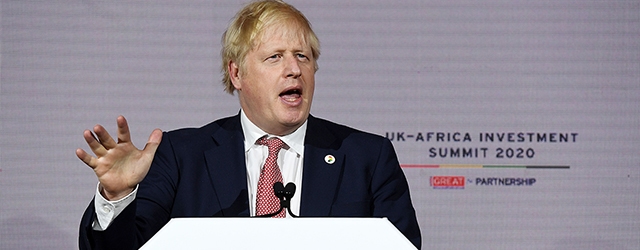Brexit is a loss for Europe but it could turn into a win for Africa.

Two African bonds listed at the London Stock Exchange (LSE) during an inaugural UK-Africa Invest summit held in London on January 20 as Britain begins the Brexit process. Attended by 21 invited African states and lasting three days, the summit also saw the British bourse sign a memorandum of understanding with the Ghana Stock Exchange (GSE).
Hosted by British Prime Minister Boris Johnson, the summit brought together businesses, governments and international institutions to showcase and promote the breadth and quality of investment opportunities across Africa. It was the latest in a series of “Africa-Plus-One” summits, encapsulating the idea of several African countries engaging a non-African state, preferably an industrialized one.
The first summit of this kind was held in France in 1972, followed by Japan in 1993, and the US in 2014 during Barrack Obama’s presidency. Most recently Russia had an African Summit last October.
However, none of these get-togethers has matched the scale and interest of the China-Africa summits, which kicked off 20 years ago. At the last one in 2018, twice as many African presidents attended the Beijing summit as attended the 73rd session of the UN General Assembly (UNGA 73) held same year.
The attention Africa is now receiving from the British government has almost everything to do with Brexit, with the UK on the verge of leaving the European Union (EU) on terms yet to be agreed. Britain needs to open up trade relations with other nations once it withdraws from trade agreements negotiated by the EU after the 18-month transition from being a member of the EU begins on January 31.
“We want to build a new future as a global free trading nation, that’s what we are doing now and that’s what we will be embarking on, on 31st of January,” PM Johnson told the gathering in London. “But I want to intensify and expand that trade in ways that go far beyond what we sell you or you sell us.”
The UK hopes to reverse its dwindling trade with Africa, which fell from 4.2% of its total trade in 2012 to just 2.0% or $46 billion in 2018. To put that in perspective, China’s 2018 trade with Africa was $204 billion, according to the country’s Ministry of Commerce. Most of that trade was with a small handful of countries; South Africa, Nigeria and Algeria account for more than half of all UK-Africa trade. “For all the talk of impact investment, the amount of capital [committed to Africa] is falling,” says Nick O’Donohoe, chief executive of CDC Group, the UK’s development finance agency. “People are pulling back; banks are pulling back. That’s partly because the cost of capital post the financial crisis has gone up. The cost of compliance has caused doing business to be more expensive.”
With Africa’s new continental free trade area expected to kick off in July 2020, African participants at the summit asked for more robust pan-African deals on goods and services, while urging the UK to do better than the EU’s stringent Economic Partnership Agreements with sub regions in Africa.
Unlike the EU, the UK signaled a willingness to eliminate rigid rules of origin on products to allow Africans to easily export to the UK.
A total of 27 deals worth an estimated $8.5 billion (£6.5 billion) were signed at the UK-Africa Summit. There were pledges for $1.9 billion (£1.5 billion) worth of initiatives for sustainable infrastructure, targeting private sector investments and drawing them to fund road, energy, ICT and other infrastructure projects in Egypt, Ethiopia, Ghana, Kenya and Uganda.
The newly signed MOU will see the LSE support Ghanaian businesses raise equity and debt capital, both domestically and internationally. The MOU also includes supporting cross-listing between the British bourse and GSE, establishing a centralized corporate news dissemination platform in Ghana to promote efficient disclosure practice and price formation; sharing of experiences of UK stock market demutualization and supporting future public market fund raising for Ghana Infrastructure Investment Fund.
Acorn Holdings Ltd, the largest Purpose-Built Student Accommodation (PBSA) property developer in Kenya, dual-listed its $42.6 million green bond program at the LSE after having listed initially at the Nairobi Securities Exchange (NSE) this January 13, becoming the first African issuer to list on London’s Sustainable Bond Market.
“This successful listing of Acorn’s bond, developed using UK aid-backed expertise, means new, affordable, environmentally-friendly housing for 5,000 Kenyans. I look forward to building more partnerships like this at next week’s UK-Africa Investment Summit in London, which will deliver more investment, jobs and growth to create a successful future for all our people,” UK Secretary of State for International Development Alok Sharma said.
Proceeds raised will finance environmentally friendly accommodation for 5,000 university students in Nairobi, the country’s capital.
The International Bank for Reconstruction and Development (IBRD) also issued its first Rwandan Franc (RWF) bond on the LSE’s main market, making it the first bond IBRD has issued in London.
“We are delighted to welcome the first Rwandan Franc bond to list on our markets, a strong signal of confidence in Rwanda’s economy. London Stock Exchange is uniquely placed to offer funding channels for local currency bonds, and we continue to support the development of African capital markets,” said Nikhil Rathi, CEO, London Stock Exchange Plc and Director of International Development, LSEG.
The RWF-denominated bonds offer investors an annual coupon of 9.25% and are payable in US dollars. The bonds settle on January 24, 2020 and mature on January 20, 2023.
There are more than 100 African bonds currently listed on LSE, raising a combined $105 billion. Additionally, London welcomed IPOs from African firms Airtel Africa and Helios Towers in 2019. Helios Towers is the second company featured in LSEG’s ‘Companies to Inspire Africa’ report to list in London, following Vivo Energy’s IPO in 2018.



